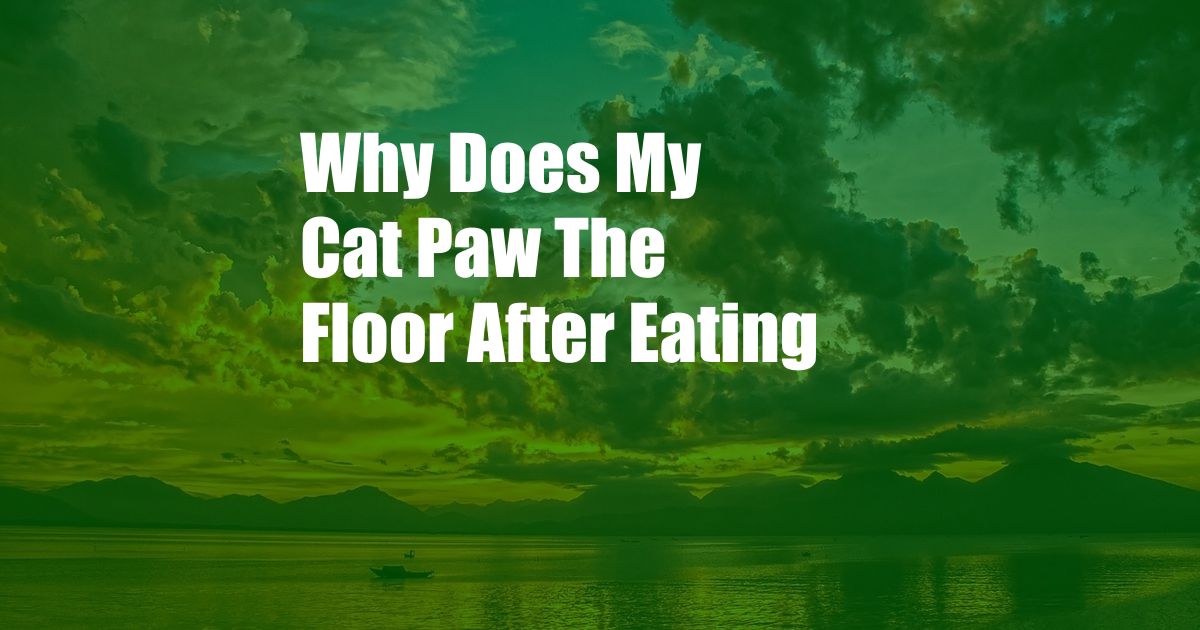
Why Does My Cat Paw the Floor After Eating?
One evening, as I sat down to enjoy a hearty dinner, my feline companion, Mittens, intently observed my every move from her perch on the windowsill. As I savored the last morsels of my meal, she hopped down and approached my plate. To my surprise, instead of begging for scraps, she began frantically pawing at the floor. I watched in curiosity as this peculiar behavior continued for several minutes before she finally settled down to groom herself.
Mittens’ post-meal floor-pawing behavior left me perplexed. What could drive this seemingly odd habit? Determined to unravel the mystery, I embarked on a quest for knowledge, delving into the fascinating world of feline behavior.
Seeking Comfort and Security
One compelling reason why cats paw the floor after eating is their innate desire for comfort and security. In the wild, cats bury their food to protect it from scavengers and ensure its availability for later consumption. The act of pawing and scratching the floor mimics this natural behavior, creating a sense of safety and security for your feline friend.
By pawing at the floor, cats also mark their territory, leaving behind scent markers that deter other animals from approaching their food source. This behavior is particularly common in multi-cat households, where each cat strives to establish its dominance over its feeding area.
Expressing Contentment
Contrarily to the aforementioned reasons, floor-pawing can also be a sign of contentment in cats. After a satisfying meal, cats may engage in playful or affectionate behaviors, such as rubbing against furniture or kneading with their paws. Floor-pawing can be a part of this repertoire, expressing their overall well-being and happiness.
It is important to note that floor-pawing is not a universal sign of contentment. Some cats may exhibit this behavior out of anxiety or stress, especially if they feel their food source is threatened. Observe your cat’s body language and overall demeanor to determine the underlying cause of this behavior.
Addressing Potential Concerns
While floor-pawing is generally a harmless behavior, it can sometimes be a symptom of an underlying health issue. If your cat exhibits excessive or persistent floor-pawing, it may be advisable to consult with your veterinarian to rule out any medical conditions, such as digestive upset or anxiety.
If no underlying health problems are identified, you can help alleviate your cat’s stress by providing a safe and low-stress feeding environment. Ensure your cat has access to multiple food bowls, placed in quiet and comfortable locations. Avoid feeding your cat in the presence of other pets or during periods of high activity.
Expert Tips and Advice
To further delve into the intricacies of this feline behavior, I reached out to renowned veterinarian Dr. Emily Carter for expert insights.
“Floor-pawing is a common behavior in cats, and it can have multiple meanings. Most often, it’s a sign of comfort and security. However, if your cat is pawing at the floor excessively or seems stressed, it’s essential to take them to the veterinarian to rule out any underlying medical issues.”
Dr. Carter also emphasized the importance of providing cats with a positive feeding experience. By creating a calm and comfortable feeding environment and respecting your cat’s natural behaviors, you can help foster their overall well-being and happiness.
Frequently Asked Questions
Q: Is it normal for cats to paw the floor after eating?
A: Yes, floor-pawing is a common behavior in cats, often associated with comfort, security, or contentment.
Q: When should I be concerned about my cat’s floor-pawing behavior?
A: Consult your veterinarian if the behavior is excessive, persistent, or accompanied by other symptoms, such as vomiting, diarrhea, or changes in appetite.
Q: How can I help my cat feel more comfortable and secure during feeding time?
A: Provide multiple food bowls in quiet and safe locations, and avoid feeding your cat around other pets or during periods of high activity.
Conclusion
Understanding the reasons behind your cat’s peculiar floor-pawing behavior can provide valuable insights into their emotional and physical well-being. Whether driven by a desire for comfort, a sense of security, or a playful expression of contentment, this behavior is often a harmless part of your feline friend’s unique personality.
By respecting your cat’s natural instincts and providing a safe and low-stress feeding environment, you can help foster their happiness and well-being. If you have any concerns about your cat’s floor-pawing behavior, do not hesitate to seek guidance from your veterinarian.
Do you have a question about your cat’s floor-pawing behavior? Share your query in the comments below, and I’ll do my best to assist you.